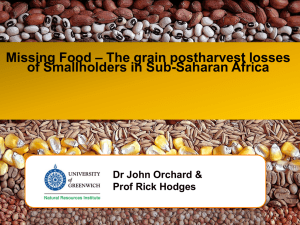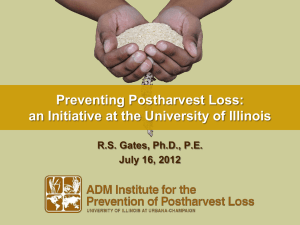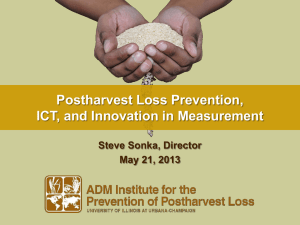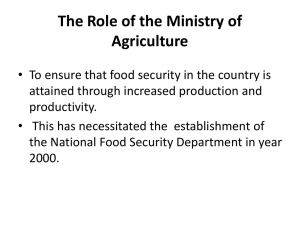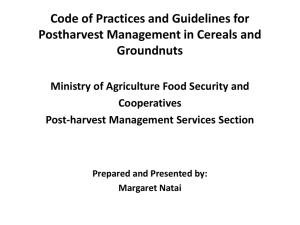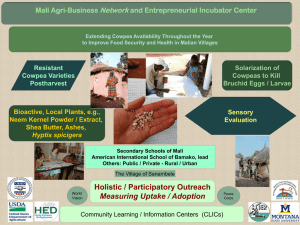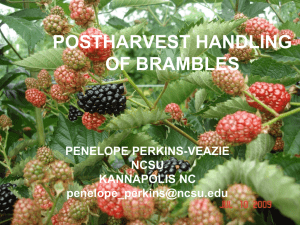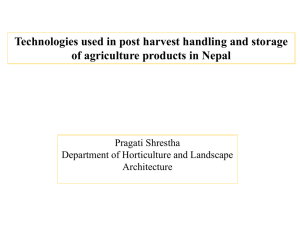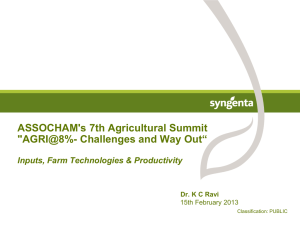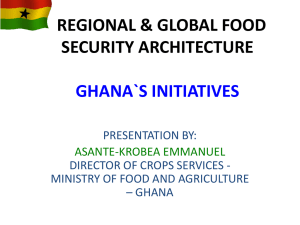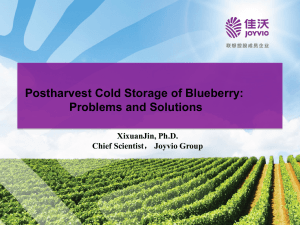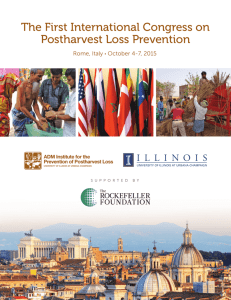Keynote Address PowerPoint - ADM Institute for the Prevention of
advertisement
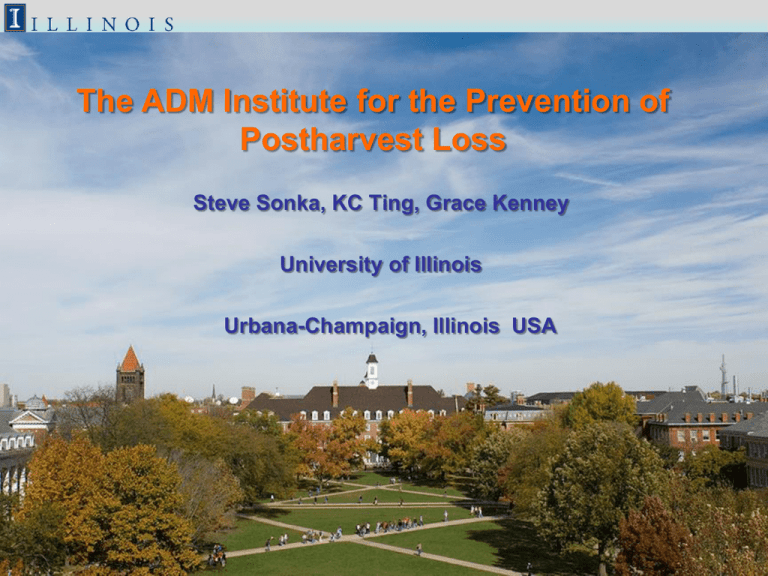
The ADM Institute for the Prevention of Postharvest Loss Steve Sonka, KC Ting, Grace Kenney University of Illinois Urbana-Champaign, Illinois USA Postharvest loss is the degradation in both quantity and quality of a food product during the chain of interconnected activities from the time of harvest to the delivery of food to the consumer (from farm to fork or from crop to consumption). Physical losses in traditional postharvest chain Cutting, handling Manual threshing Sun drying Open storage Village milling 1-5% 1-5% 3-5% 5-10% 20-30% Small retailers In SE Asia, physical losses range from 15-25%. Crop Quality losses range from 10-30% (loss in value) Consumption Machine threshing Combine harvesting Mechanical drying Sealed storage Commercial milling 1-5% 1-5% 1-2% 1-2% 5-10% Physical losses in mechanized postharvest chain Large retailers Why Postharvest Loss Prevention? • Investment required to reduce postharvest loss could be modest compared to the benefit • With technological advances, its conceivably more feasible and less expensive to address • Arable land, water, energy is in limited supply – we need to focus on preserving what is produced • Due to market liberalization, need careful public action to help the private sector rather than crowd it out The ADM Institute for the Prevention of Postharvest Loss Organizational Developments in 2011 Fall, 2010 Initial conversations Jan 19, 2011 Official announcement & celebration Feb, 2011 Seed research efforts initiated Mar – Jul, 2012 Visioning processes Fall, 2011 RFP issued / $2.1 million in funding allocated Throughout 2011 – Prospecting for collaborating entities ADM Institute Governance Structure Steering Committee Andrew Alleyne: Engineering Peter Goldsmith: Ag Economics Steve Mills: ADM External Advisory Board Robert Easter: University of Illinois, Chair Usha Barwale-Zehr: Mahyco Carlos Campabadal: Asociación Americana de Soya-IM Udatta Palekar: Business Ashok Gulati: Government of India Steve Sonka: Institute Director Hans Joehr: Nestle KC Ting: Ag & Bio Engineering Dirk Maier: Kansas State University Kent Miller: John Deere Steve Mills: ADM Steve Sonka, Director Project Managers Arlene Mitchell: Gates Foundation Daniel Queiroz :Universidade Federal de Viçosa (Additional Individuals to be Identified) Project Managers Project Managers Project Managers The ADM Institute for the Prevention of Postharvest Loss Vision Statement The ADM Institute for the Prevention of Postharvest Loss will serve as an international information and technology hub for evaluating, creating and disseminating economically viable technologies, practices and systems that reduce post-harvest loss in staple crops such as corn, wheat and oilseeds (also rice and lentils). Educational, R&D, and Outreach Functions • Conduct transformational R&D activities that will lead to reduced postharvest loss through implementation of technology advancements and improved supply chain and information systems • Establish strategic partnerships with ADM, government organizations and key academic and NGO partners to build the network of global institutions necessary to identify important research and implementation needs and to enhance implementation of research results • Establish a post-harvest loss website to rapidly disseminate information and accelerate the transformation of post harvest loss science into practices and systems implemented throughout corn, wheat and oilseed supply chains • Develop courses to provide training on best practices and technologies for minimizing post-harvest loss Research Themes Focus area Brief Descriptions Measurement & technology Development Determining the extent of loss and creating specific innovations that, if successful, can effectively reduce post harvest loss. Systems informatics & analysis Quantitative modeling to analyze specific settings of interest, explicating including the relevant supply chains and systems Policy analysis Analyzing effects of public and institutional policies and evaluation of potential improvements Education, training, & information transfer Implementing tools to enhance performance of farmers and supply chain participants, providing thought leadership at significant conferences, sponsorship of events, and dissemination of findings through electronic and other media. The ADM Institute for the Prevention of Postharvest Loss Funded Case Studies in India Understanding Rice Postharvest Losses, Tamil Nadu Marketplace Literacy Project Baseline to Study the Value Chain of Maize in Rajasthan Indian Society of Agribusiness Professionals (ISAP) Mapping the Production System and the Supply Chain Study the Crop Losses of Black Gram in Maharashtra & MP MART A Study on Pigeon Pea Postharvest Loss in Maharashtra: Maharashtra Hybrid Seed Company (Mahyco) The ADM Institute for the Prevention of Postharvest Loss Research Projects Recently Funded Measurement, Documentation and Postharvest Processing for the Prevention of Postharvest Losses of Soybeans and Corn M.C. Danao, R.S. Gates, S.R. Eckhoff, M.R. Paulsen • determine extent and cost of harvest losses • measure the key influencing conditions during transport and within storage • develop a Computational Fluid Dynamics model • develop alternate structures for on-farm storage Education, Training and Information Transfer to Minimize Postharvest Losses – Scientific Animations Without Borders Barry Pittendrigh, Julia Bello-Bravo, Francisco Seufferheld, Madhu Viswanathan • develop a platform for educational materials that can be used to educate visual learners involved in the postharvest process • produce educational materials that use highly detailed animations with voice overlaid in local languages and dialects Supply Chain Policy and Strategy Analysis for Prevention of Postharvest Loss Kathy Bayliss, Dilip Chhajed, Mindy Mallory, Udatta Palekar • measure how institutions affect the markets & participants and the loss in crop quantity, quality and income • develop the cause and effect relationship between policies and postharvest losses • develop tools for postharvest loss interventions and assess the effectiveness of these solutions in India • examine the effect of new infrastructure innovations and availability of spot market prices • develop a game-theoretic model to understand equilibrium investment decisions Appropriate Technology Development and System Integration for Post-Harvest Loss Prevention Ximing Cai, Imad Al-Qadi, Khaled El-Rayes, Youssef Hashahs, Praveen Kumar, Wen-Tso Lui, Paramita Mondal, John Popovics, Junho Song, Dan Work, Mary-Grace Danao, Steven Eckhoff • assess appropriate technologies and system integration focusing on near-farm storage facilities • develop structural components in the supply chain • design a resilient and reliable supply chain • conduct sustainability assessment • make recommendations of solutions for two case studies in India and Brazil based on the technology development, system design and assessment Concurrent Science, Engineering, and Technology for the Prevention of Postharvest Loss Luis Rodriguez, Yogendra Shastri, Yanfeng Ouyang • develop informatics, modeling, and decision support computational platform for implementing Concurrent Science, Engineering, and Technology (ConSEnt) concept • build collaborative connections in India and Brazil for acquisition of country specific data • perform targeted modeling and analysis for the prevention of postharvest loss • implement a web-based decision support environment The Nature of Small Landholder Agriculture in the Brazilian States of Sao Paulo and Parana and Implication for Understanding Post-Harvest Loss Mary Arends-Kuenning • produce report on how postharvest loss affects smallholders in the states of Sao Paulo and Parana, Brazil with the following key questions: • What grains the smallholders produce? To what extent do acreage choices depend on the susceptibility of grains to postharvest loss? • What is the extent on postharvest loss? At what stage of the supply chain does loss occur? • Who bears the cost of postharvest loss? • What are the transaction costs that prevent stakeholders from investing in technology that reduces postharvest loss? Managing Grain Losses in Continuous Cropping Systems of the Tropics through On-Farm or Cooperative Storage Peter Goldsmith and Altair Moura • conduct economic research on grain loss under the increasingly common high temperature, high humidity, and high rainfall environments of tropical grain production • discover additional impacts of distances and the lack of accessible storage on postharvest loss in this climate Strategic Partnership Explorations Establish strategic partnerships with ADM, government organizations and key academic and NGO partners to build the network of global institutions necessary to identify important research and implementation needs and to enhance implementation of research results SELECTED POTENTIAL ENTITIES India • Digital Green • Government of India Ministry of Agriculture • Haryana Agricultural University • Indian Society of Agribusiness Professionals • Mahyco Seed Co. • MART • Indian Consul in Chicago Other Brazil • Associaçço dos Produtores de Soja do Estado de Mato Grosso • CENTREINAR -- University of Vicosa • Embrapa • Escola Superior de Agricultura “Luiz de Queiroz” – Logistics • Foundation Mato Grosso • World Bank • Food and Agriculture Organization • International Rice Research Institute • Iowa State University • Kansas State University • Oklahoma State University • Peace Corps • Purdue University • Union of African States • University of California, Davis The ADM Institute for the Prevention of Postharvest Loss Thank You
